
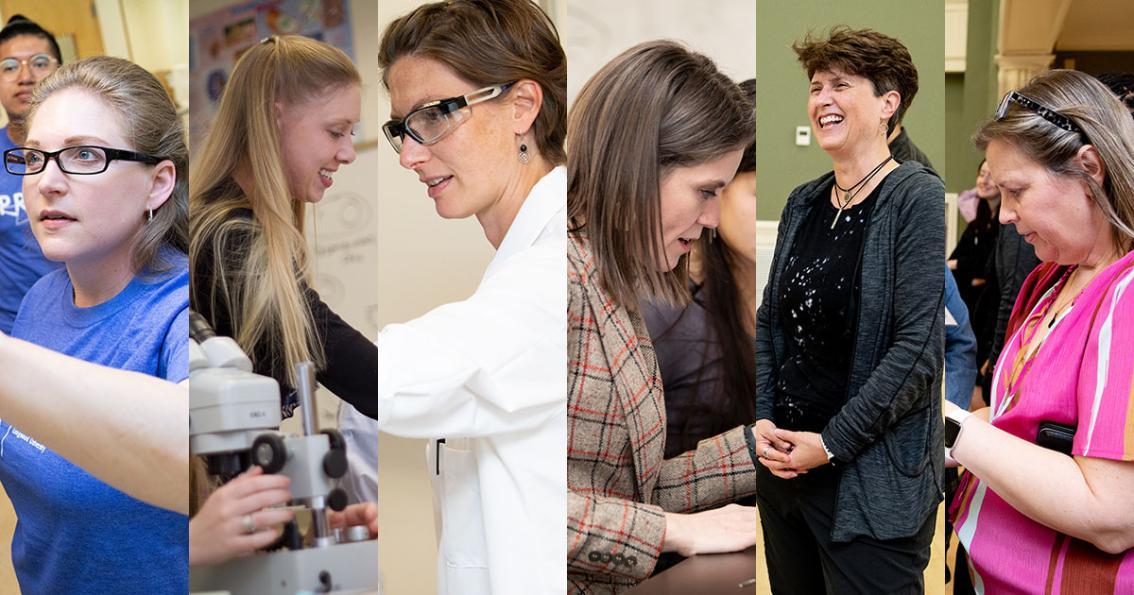
Innovative programs that spring from big ideas. Pipelines for substantial research experiences. Multi-year studies of pressing issues.
These are all signs of a robust and engaged faculty at any university. At Longwood, these ideas and initiatives are being put in place at a staggering pace, especially in science, technology, engineering, and mathematics (STEM) fields. And more often than not, they are being developed by a group of women scientists and mathematicians working in a field traditionally dominated by their male colleagues who build on each other's strengths and team up with each other–often across disciplines–to build programs for the future.
Within the last few years, Longwood women scientists have landed three major National Science Foundation grants for a total investment of more than $4.6 million. Elsewhere, women faculty are developing and expanding research programs that have sent students to graduate schools like Dartmouth and Colombia, and earned students highly competitive national scholarships.
Behind the scenes on many of those grants and university-funded initiatives is a network of faculty and administrators who help shape their development—more often than not led by Dr. Alix Fink, associate provost for research and academic initiatives and professor of biology whose expertise is often sought by faculty with ideas big and small. Fink has been intimately involved in landing some of the National Science Foundation grants that have supported some of the big ideas on campus like LifeSTEM (see below).
Fink has also served as principal investigator for a National Science Foundation grant that supports the PULSE Ambassadors Program, a network of life sciences faculty members wo work with academic departments to develop cohesive action plans for change.
We sat down with just a few of the women across campus who have created a STEM-based initiative and who work closely with students on STEM research.
Dr. Amorette Barber
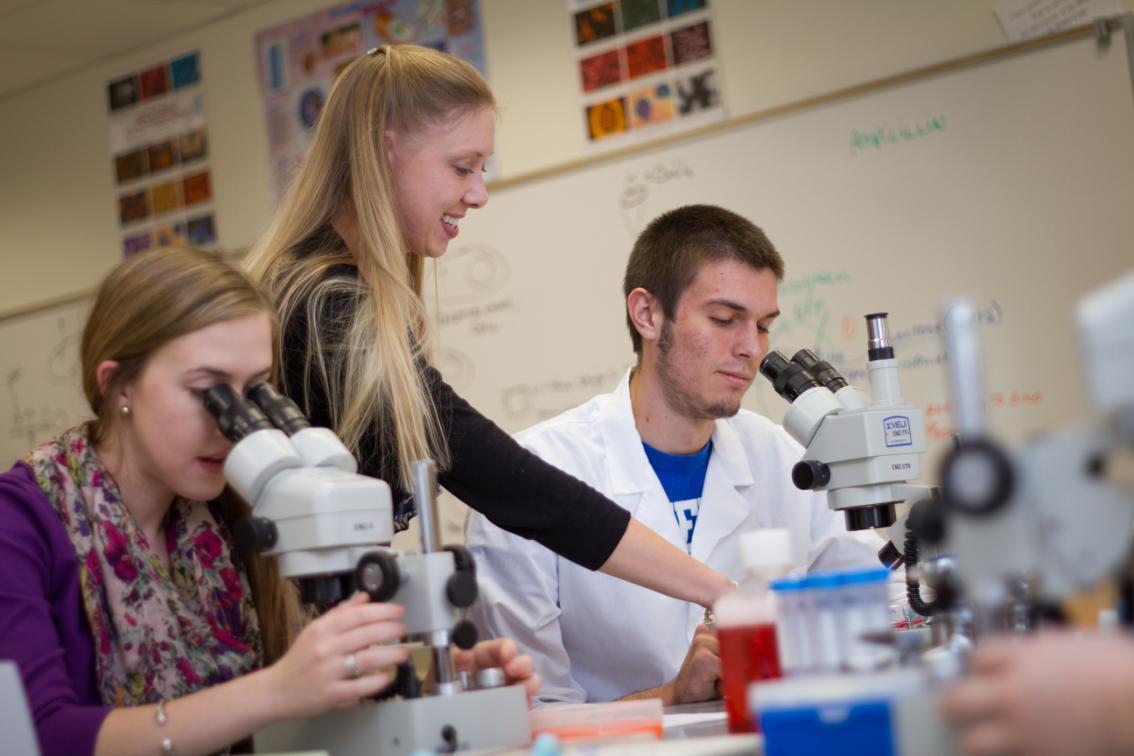
Professor of Biology
Director, Office of Student Research
Founder of the Undergraduate Research Apprenticeship Program, a pipeline that introduces students to mentored research experiences and prepares them for more intense experiences like PRISM.
- Been at Longwood: 12 years
- On college experience: As an undergrad, I started doing research my junior year–but before that I had a lot of strong women faculty who were really supportive. My research mentor was a woman, the person who got me into immunology was a woman, so it was great to see these women who were awesome in science and awesome in teaching but also had families and had a really good life balance, and so that made a difference early on.
- On passing it along: Now I want to be a role model for all of our students, not just women, but I happen to work with a lot of women in my research lab and have a LifeSTEM mentee who is a woman. It’s fun to work with them and help them see themselves as scientists. It’s important to me to see that they get the support they need early on.
- On the Office of Student Research: I started working with students in a research capacity right away, and never wanted to be in administration, but wanted to help develop research experiences for students outside of the sciences. So Dr. Porter and I started the Showcase for Student Research, and I wanted to spread these programs campuswide. This is the administrative role that I love. I’ve really enjoyed building this program and helping find research travel grants, expanding our research publication called Incite, starting the undergraduate research apprenticeship program. That’s been so fun and rewarding.
- Favorite class to teach: Immunology. I really love teaching that class. It’s mostly juniors and seniors and there are a lot of applications to immunotherapy. There are so many immunotherapies out there right now, so a lot of our papers and projects are focused on application of immunology to modern healthcare. I really love that class. Biology of Cancer is another favorite one of mine.
Dr. Kathy Gee
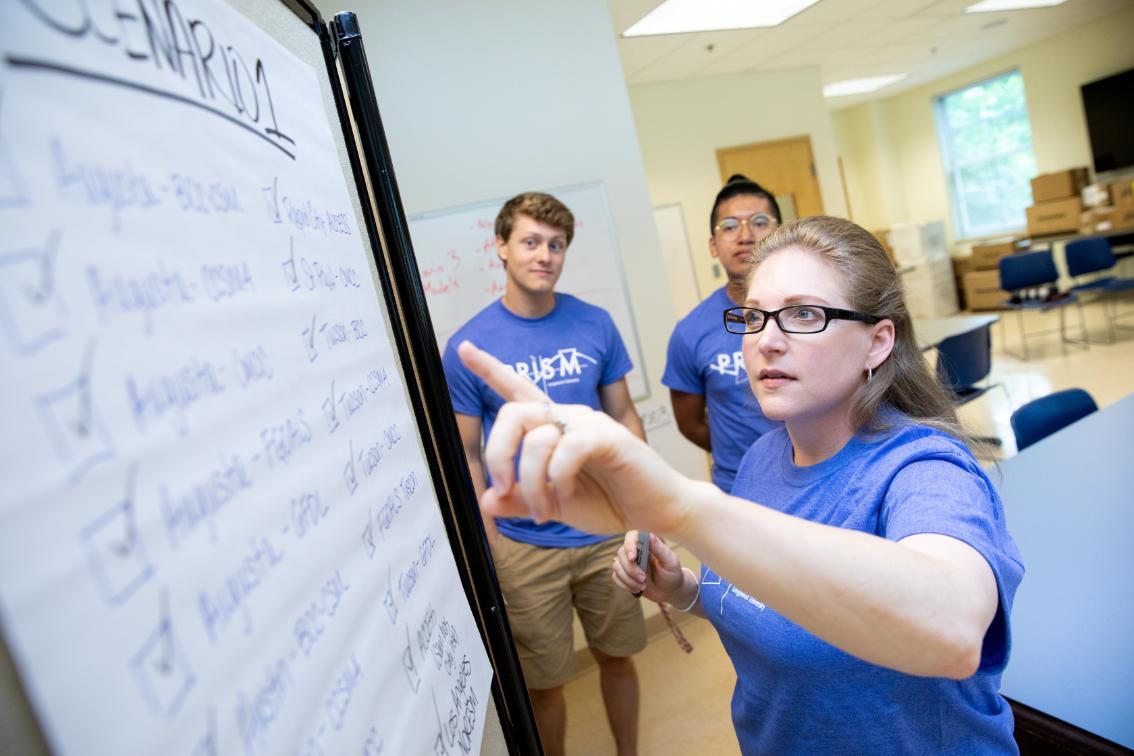
Associate Professor of Environmental Science
Coordinator, Environmental Science Program
Earned a National Science Foundation Engineering Research Initiative grant to evaluate new methods for measuring bacteria in harvested rainwater
- Been at Longwood: 10 years
- Favorite class to teach: Watershed management. It aligns well with my research interests and I get to get out into the field with students and collect data. It’s very hands-on. There is a creek behind the Environmental Education Center. We’ve done macroinvertebrate sampling, physical and chemical analysis and microbiological analysis on the water to see what’s in it. We’ve done field surveys to map out the stream bank and we can see over time how it changes. It’s our own outdoor lab.
- On PRISM research: When I’m doing PRISM in the summer, I get to spend all of my time focused on a single project. My research in general focuses on rainwater harvesting systems and I’ve been able to utilize those PRISM experiences to look at different aspects of those systems. I decided a while ago to focus on human health issues related to rainwater harvesting. Mosquitos are obviously a human health concern due to their transmission of diseases. The NSF grant is funding my current research into legionella in harvested rainwater that I’ll be doing with two PRISM students this summer. Many universities are not able to provide the opportunity for an undergraduate freshman and junior to work on an NSF grant of this size. We are providing very unique opportunities for students and it will most certainly set them apart as they pursue educational and professional opportunities in the future.
- On women in STEM: Longwood is really good about designating internal resources to support STEM, which shows we value work in the STEM fields. It’s nice to be surrounded by successful women who are excelling in that field and Longwood is great about celebrating our achievements.
Dr. Michelle Parry
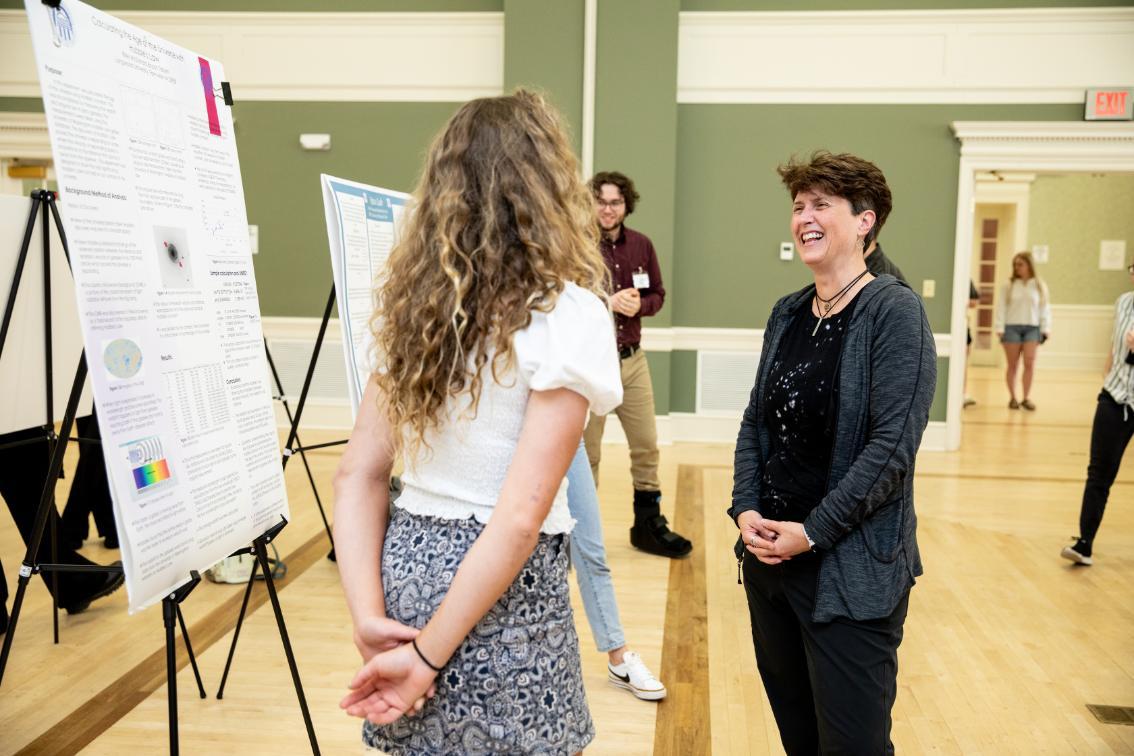
Professor of Physics
Lead professor on a team that earned an NSF grant to establish the LIFE STEM program, which provides scholarships, academic support and hands-on learning experiences for students preparing for careers in science, technology, engineering and mathematics (STEM) fields.
- Been at Longwood: 24 years
- Favorite class to teach:
I enjoy teaching the lab course that our physics majors take their second year on campus because I think it has a big impact on them in terms of developing as professionals. By the end of the course they have become better writers and more proficient at performing experiments and keeping track of all their experimental uncertainty. Once they graduate from Longwood, I think they realize how important the course was in preparing them for future work. I also enjoy teaching the conceptual physics class that a lot of our future educators take because you can see a lot of light bulbs going on as the students start to see the connections between science and their everyday lives. - On representation: When I went to college, I went to a small school like Longwood, but I was the only woman physics major at the university and all of the physics faculty were men. When I was a senior, I heard through the grapevine that there may be another female physics major but never had the opportunity to connect with her. Now, at Longwood, I have the opportunity to mentor a large number of students. I almost always teach our freshman first semester physics course for majors, and I don’t think there are a lot of universities where that course is being taught by someone who has the years of experience that I have. One of the great things about teaching our majors in the first semester is that I really get to know those students and with my years of experience I can identify when they are struggling and provide strategies for helping them be successful at Longwood, especially if they come from a group that is underrepresented in science.
- On mentorship: Having been a LIFE STEM mentor, I am able to identify more quickly those individuals who are struggling, and understand that the struggle might be unrelated to their academic ability but instead other issues possibly related to the transition to college life or other factors that we all deal with in our everyday lives. With my experience in the LIFE STEM Program and years at Longwood, I am able to make myself more available to those students and often reach out to them proactively when I see a student in need. A few years ago, I had a first-generation student in my introductory physics course who was struggling with having a job on campus and all that comes with that. I just started talking with him after class one day and this developed into me becoming one of his main resources as he completed his degree and eventually went on to graduate school.
- On LIFE STEM: We applied for a grant from the National Science Foundation to develop a program to promote STEM scholars through scholarships, focused academic support, career preparation, early research experiences, and intentional faculty mentoring. We’re now graduating our third cohort. We have our fourth cohort currently completing their first year and are working on recruiting our fifth cohort through funding from our second NSF grant.
Dr. Sarah Porter
-1134x756.jpg)
Professor of Chemistry, Chair of the Department of Chemistry & Physics
Founder, Longwood Summer Scholars
- Been at Longwood: 16 years
- Favorite moment of the year: I get excited about the beginning of the semester when everyone is enthusiastic. I love meeting freshmen, and I like the energy of meeting new freshmen who are eager to learn.
- Favorite class to teach: Quantitative Analysis, CHEM 350. In my mind it’s the most relevant chemistry of all of the chemistry for pretty much anyone who is in any science. It’s water chemistry and all the equilibria that goes on in your body. Students tend to put a lot of pieces together during that class.
- On mentorship: I went to a large university, and I hardly knew any of my professors as an undergraduate. It’s easy here and I think we are good at it in this department. I know every chemistry major, and I know most of the physics majors because it’s small and easy to know everyone. Developing a mentoring relationship at Longwood happens a lot because all of our students are required to do a research project, so we work closely together. It’s very fulfilling to work with someone for several years and help them reach another level in their studies and life.
- On Summer Scholars: I kept reading articles about different initiatives that were designed to introduce high school students to college-level research, and I thought that we could really do that at Longwood. There just aren’t a lot of opportunities for students in this region who are interested in chemistry or another STEM field to find opportunities to engage with those disciplines while they are in high school. We’ve had a lot of success with the high schoolers who have come for this paid summer research opportunity–even lighting a fire in a few who plan to pursue research as a career!
Dr. Melissa Rhoten
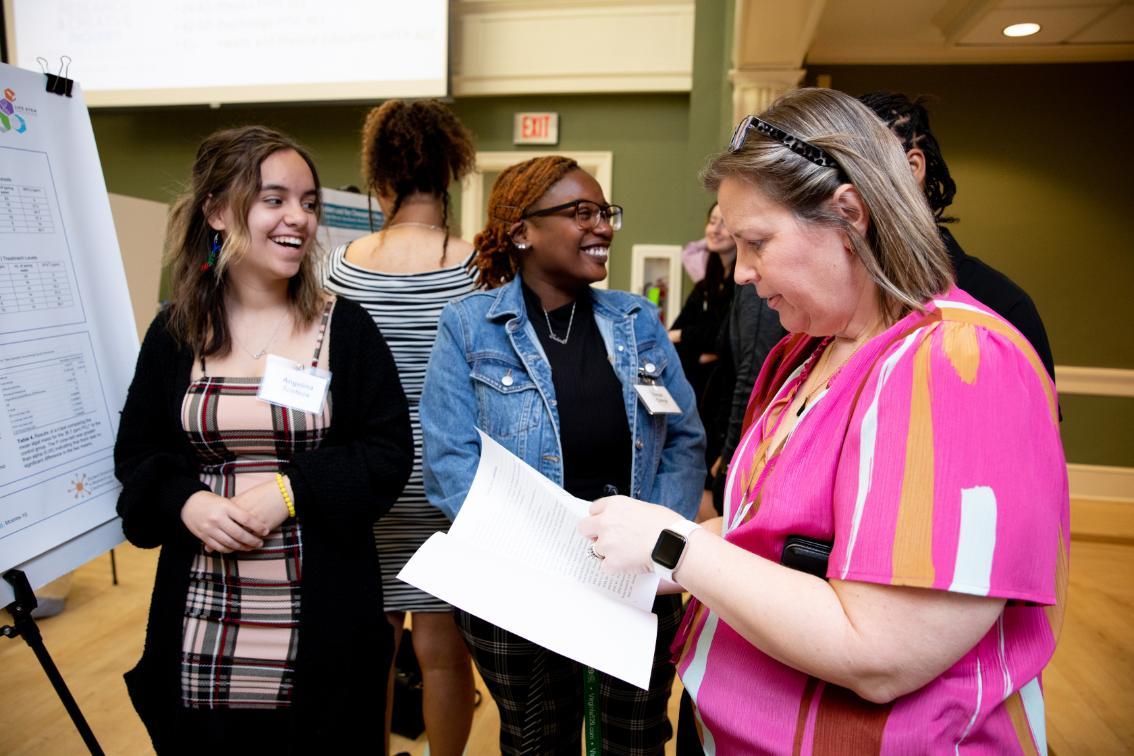
Professor of Chemistry
Part of the team that earned an NSF grant to fund new STEM teacher pipeline to rural school districts
- Been at Longwood: 22 years
- Favorite class to teach: Quantitative Analysis, CHEM 350. It’s the first class in our analytical chemistry sequence. It’s just filled with concepts that are around us every day. You can’t think about anything going on in your body or in the environment without these concepts, especially this concept of equilibrium that has to do with a lot of the chemical reactions that we see in the body and in the environment.
- On working with students: My philosophy on teaching comes out of my own undergraduate experience, which was in a small department and we all knew our professors and worked with them closely. That was really important as I developed as a chemist. It’s what I looked for when I was looking for a job. The practical knowledge that we impart is important, but equally important is that I can write a student an actual recommendation to graduate school because I have worked with them and watched them grow for three years. We just had a community forum for our majors and one of the things that was really gratifying was the students talked a lot about our open-door policy and how much it means to be able to talk to any of us faculty members about anything.
- On the NSF grant: We are in desperate need in this country for qualified high school level STEM teachers. We have been working on this grant for several years and it will provide significant funding for 20 students, the majority of whom will come from our partnering community colleges to develop STEM teachers to go and teach in high-need school systems. Hopefully they will graduate with little to no debt.
Dr. Leah Shilling-Stouffer
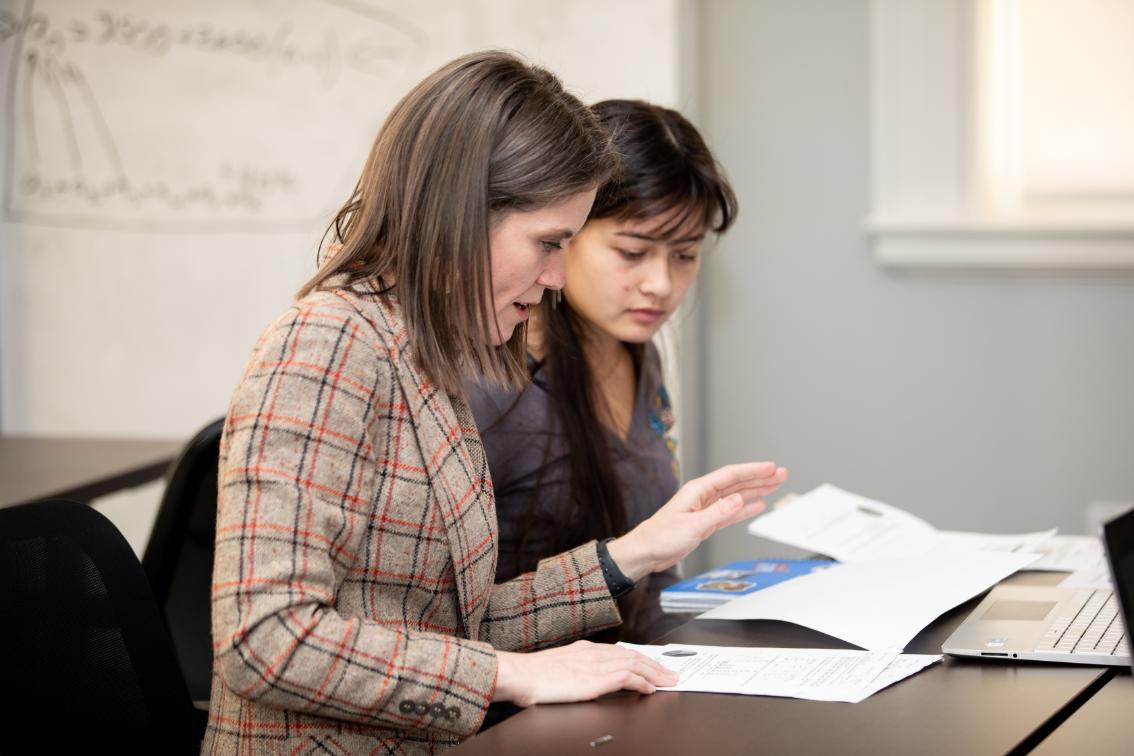
Associate Professor of Mathematics
Director, Quantitative Reasoning Center
Principal investigator on the team that earned a NSF Robert Noyce Teacher Scholarship Program grant to fund new STEM teacher pipeline to rural school districts
- Been at Longwood: 13 years
- On STEM teachers in rural areas: A core group of us who are passionate about STEM education started seeing that some of our community college partners had scholarships in place for some of their students that matched up with one of our long-term goals: to help funnel STEM teachers into school districts that need it the most. We got the grant to fund 20 future teachers from community college level straight through Longwood so they graduate with little to no debt and then go teach in a rural setting. It seems like a small number of teachers, 20 teachers, but when you think about those twenty teachers going into classrooms and how many students they are going to be touching and how many students they are going to be teaching, they are going to be taking this fire that we have. When I think about why I love teaching, it’s because I love math, and I love passing that on. Those are our future scientists and engineers, and they don’t even know it yet.
- On women in STEM: When I think about my own undergraduate experience, I had so few female professors. There was one female professor in my major who was an alum of the college, and I remember her saying that she came back to teach at her alma mater because she wanted to be the person she didn’t see when she was a student. I remember that hitting me so hard. And when I came to Longwood to interview, in the room were all of these amazing, strong women on the math faculty: Leigh Lunsford, Jackie Hall, Maria Timmerman, Sharon Emerson-Stonnell, Virginia Lewis.
- Favorite class to teach: The biggest service class we teach in the math department here is MATH 171 Statistical Decision Making. There are a ton of sections because it’s required by a lot of majors, but sometimes it can be hard to engage people who aren’t math majors in the subject matter. So I tried to bridge a love of math and a background in education to start framing it in “how can you use this?” So many jobs have to deal with data and questions and the ability to interpret qualitative data. Every semester I’ve had a student come up to me and say “I’ve never understood math but I understand how this applies to my life now.”
- On Color Wars: I missed it somehow for a long time, but in 2015 I just did it. I just went out there in the middle of the field and was part of the chaos, and it was one of the most fun things I’ve ever done. It was amazing.
